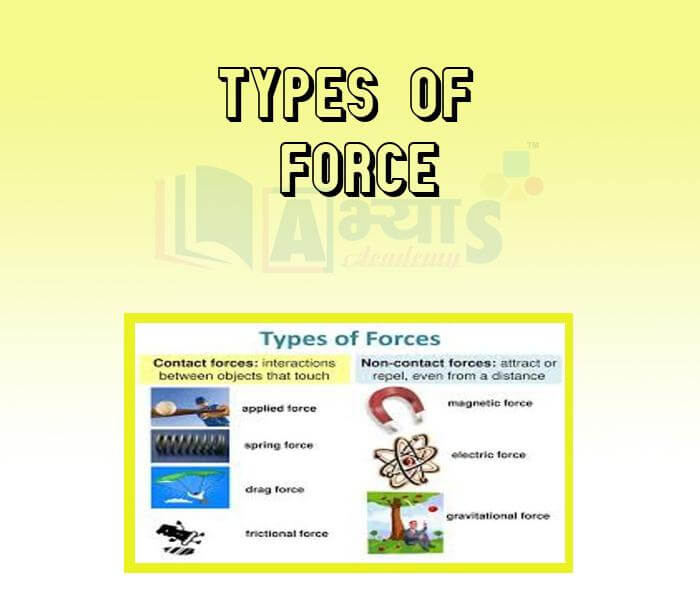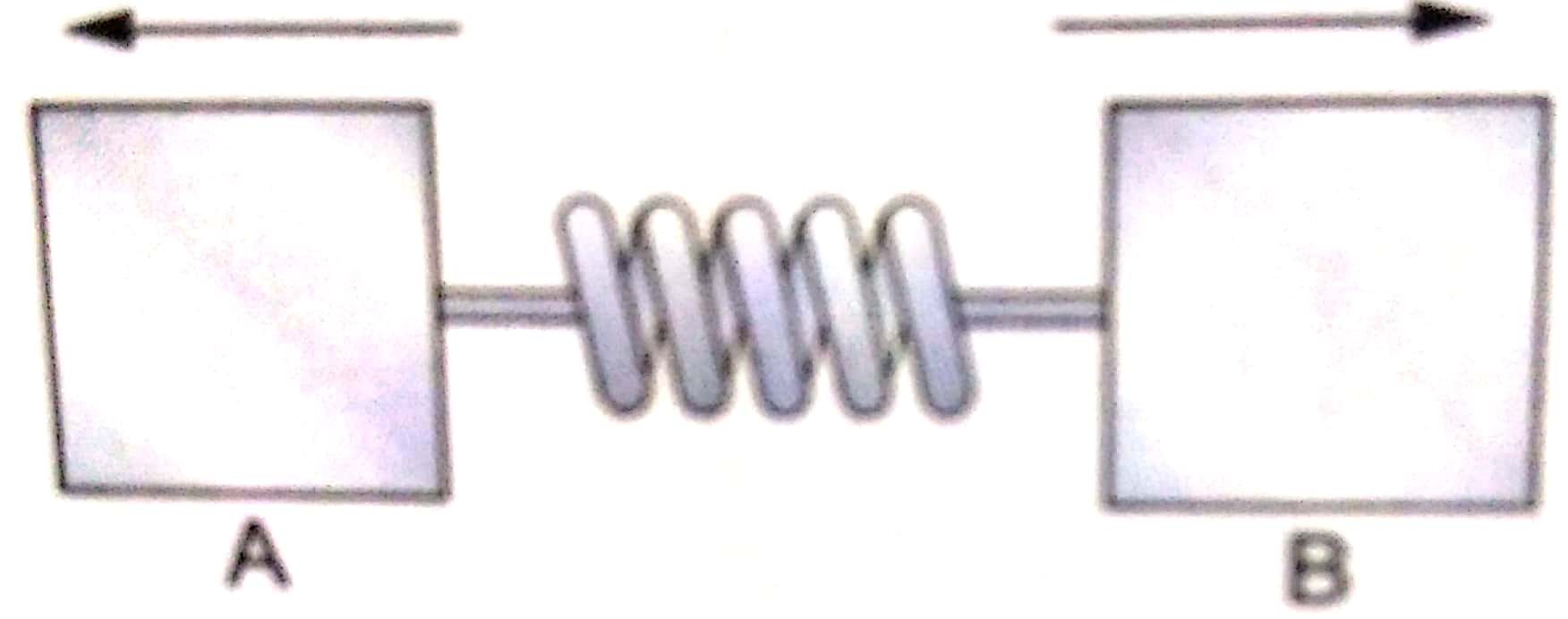Types of Force









Types of Force
Force is a cause that can change the state of motion or the shape of an object. There are two types of forces based on the way they are applied:
1. Contact Force:
Force that comes into action after the interaction between objects is called contact force. Contact force acts on the point of contact. For contact force; interaction between objects is necessary. Example: pushing a car, opening a drawer, kicking a ball, etc. In these examples, interaction between objects is necessary. Muscular force, force of friction, etc. are types of contact force. Other examples include cycling, kicking a ball.
Muscular Force or Biological Force: Force caused by the action of muscles is called muscular force. In other words, force resulting because of action of muscle is called muscular force. Muscular force is applied only after interaction with the object. Hence it is a type of contact force. Example: While kicking a ball, the player applies force over the ball using his leg muscles.
Frictional Force: Force acting between the surfaces of two objects is called the force of friction. Force of friction always acts in the direction opposite to the direction of the movement of object. Force of friction is acting over all the moving objects. Example: A moving football stops after going to a certain distance. This happens because of force of friction between the surface of ground and the surface of football. A moving boat stops after some distance because of friction between the surface of water and the surface of boat. Since force of friction comes into action only after interaction between two objects, thus, it is a type of contact force.
Spring Force: A spring is made up of coiled metallic wire. A spring has a definite length when it has been neither pushed nor pulled. The length is called natural length. At natural length the spring does not exert any force on the object attached to its ends. If the spring is pulled at the ends its length becomes larger than natural length. It is known as stretched or extended spring. An extended spring pulls objects attached to its ends . If the spring is pushed at the ends, its length becomes less than natural length. It is known as compressed spring. A compressed spring pushes objects attached to its ends
 |
 |
 |
| Extended Spring | Compressed Spring | Natural Length |
Elastic Force: When we stretch, twist or bend certain objects like a spring, rubber band or sponge their shape and size changes. The force which acts is called elastic force.
2. Non – Contact Force:
Force that comes into action without interaction between two objects is called non-contact force. For example; a magnet can pull an iron nail from a distance. Magnetic force, Electrostatic force and Gravitational force are examples of non-contact force.
Magnetic Force: Force exerted by a magnet on another magnet or on magnetic substances is called magnetic force. A magnet can exert force even without coming in contact, thus it is a non-contact force. Magnet cause a force in the area around them. The area of force around a magnet is called ‘magnetic field.’ Earth also has a magnetic field. It is surrounded by magnetic lines of forces. We can also use magnetic compass to see the magnetic fields of Earth. Example – A magnet attracts the opposite pole of another magnet and repels the similar pole of another magnet.
Electrostatic Force: Force exerted by a charged body is called electrostatic force. A charged body attracts an uncharged body. A positively charged body attracts a negatively charged body and repels a positively charged body without coming in contact, thus it is a non-contact force.
Gravitational Force: Force exerted by earth, moon, sun and other planets is called gravitational force or force of gravity. Earth attracts all objects towards it. Similarly, all other planets along with moon attract all objects towards them. Since, earth attracts all objects even without coming in contact, thus gravitational force is a non-contact force. The force of gravity depends on the mass of object and their distance from each other. Example: When anything is released from a height, it falls over the ground because of gravitational pull of earth.
When we stretch, twist or bend certain objects like a spring , rubber band or sponge their shape and size changes. This type of force is called as _________________ .
| |||
| Right Option : A | |||
| View Explanation | |||
Which of the following case the force is different from others | |||
| Right Option : D | |||
| View Explanation | |||
When a charged balloon attaches to a wall without any help force that is in action is ________________________. | |||
| Right Option : B | |||
| View Explanation | |||
Students / Parents Reviews [20]
I have spent a wonderful time in Abhyas academy. It has made my reasoning more apt, English more stronger and Maths an interesting subject for me. It has given me a habbit of self studying

Yatharthi Sharma
10thThird consective year,my ward is in Abhyas with nice experience of admin and transport support.Educational standard of the institute recumbent at satisfactory level. One thing would live to bring in notice that last year study books was distributed after half of the session was over,though study ...

Ayan Ghosh
8thAbhyas is an institute of high repute. Yogansh has taken admission last year. It creates abilities in child to prepare for competitive exams. Students are motivated by living prizes on basis of performance in Abhyas exams. He is satisfied with institute.

Yogansh Nyasi
7thMy experience with Abhyas academy is very good. I did not think that my every subject coming here will be so strong. The main thing is that the online tests had made me learn here more things.

Hiya Gupta
8thIn terms of methodology I want to say that institute provides expert guidence and results oriented monitering supplements by requsite study material along with regular tests which help the students to improve their education skills.The techniques of providing education helps the students to asses...

Aman Kumar Shrivastava
10thBeing a parent, I saw my daughter improvement in her studies by seeing a good result in all day to day compititive exam TMO, NSO, IEO etc and as well as studies. I have got a fruitful result from my daughter.

Prisha Gupta
8thA marvelous experience with Abhyas. I am glad to share that my ward has achieved more than enough at the Ambala ABHYAS centre. Years have passed on and more and more he has gained. May the centre flourish and develop day by day by the grace of God.

Archit Segal
7thAbhyas is good institution and a innovative institute also. It is a good platform of beginners.Due to Abhyas,he has got knoweledge about reasoning and confidence.My son has improved his vocabulary because of Abhyas.Teacher have very friendly atmosphere also.

Manish Kumar
10thWe started with lot of hope that Abhyas will help in better understnding of complex topics of highers classes. we are not disappointed with the progress our child has made after attending Abhyas. Though need to mention that we expected a lot more. On a scale of 1-10, we would give may be 7.

Manya
8thIt was a good experience with Abhyas Academy. I even faced problems in starting but slowly and steadily overcomed. Especially reasoning classes helped me a lot.

Cheshta
10thMy experience with Abhyas academy is very nice or it can be said wonderful. I have been studying here from seven class. I have been completing my journey of three years. I am tinking that I should join Abhyas Academy in tenth class as I am seeing much improvement in Maths and English

Hridey Preet
9thMy experience was very good with Abhyas academy. I am studying here from 6th class and I am satisfied by its results in my life. I improved a lot here ahead of school syllabus.

Ayan Ghosh
8thAbhyas is a complete education Institute. Here extreme care is taken by teacher with the help of regular exam. Extra classes also conducted by the institute, if the student is weak.

Om Umang
10thMy experience with Abhyas is very good. I have learnt many things here like vedic maths and reasoning also. Teachers here first take our doubts and then there are assignments to verify our weak points.

Shivam Rana
7thAbhyas Methodology is very good. It is based on according to student and each child manages accordingly to its properly. Methodology has improved the abilities of students to shine them in future.

Manish Kumar
10thAbout Abhyas metholodology the teachers are very nice and hardworking toward students.The Centre Head Mrs Anu Sethi is also a brilliant teacher.Abhyas has taught me how to overcome problems and has always taken my doubts and suppoeted me.

Shreya Shrivastava
8thUsually we see institutes offering objective based learning which usually causes a lag behind in subjective examinations which is the pattern followed by schools. I think it is really a work of planning to make us students grab the advantages of modes of examination, Objective Subjective and Onli...

Anika Saxena
8thWhen I have not joined Abhyas Academy, my skills of solving maths problems were not clear. But, after joining it, my skills have been developed and my concepts of science and SST are very well. I also came to know about other subjects such as vedic maths and reasoning.

Sharandeep Singh
7thAbhyas academy is great place to learn. I have learnt a lot here they have finished my fear of not answering.It has created a habit of self studying in me.The teachers here are very supportive and helpful. Earlier my maths and science was good but now it has been much better than before.

Barkha Arora
10thAbhyas institute is one of the best coaching institute in the vicinity of Ambala cantt.The institute provides good and quality education to the students.The teachers are well experienced and are very helpful in solving the problems. The major advantages of the institute is extra classes for weak...
